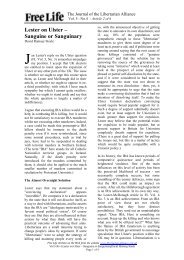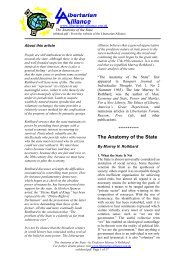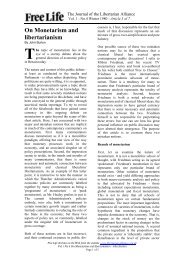Download - The Libertarian Alliance
Download - The Libertarian Alliance
Download - The Libertarian Alliance
You also want an ePaper? Increase the reach of your titles
YUMPU automatically turns print PDFs into web optimized ePapers that Google loves.
<strong>The</strong> <strong>Libertarian</strong> <strong>Alliance</strong> is an independent, non-party group, with a shared desire to work for a free society.www.libertarian-alliance.org.uk15 th May 2007A series of New and Archived articles from the WebsiteWhy <strong>Libertarian</strong>s ShouldBe Concerned with theHistory of PoliticalThoughtBy Gene Callahan<strong>The</strong> standard libertarian solution to howpeople best can achieve the obviousbenefits of mutual cooperation whilstmaintaining respect for the dignity andautonomy of the individuals comprisingany social group possesses the virtue ofbeing the readily comprehensibleconsequence of accepting a smallnumber 1 of intuitively appealing principles.However, what proponents regard asadmirably simple readily can appearsimplistic if libertarian apologists displaylittle awareness of the location of theirideas within the great currents runningthrough the history of European politicalthought, a history incorporating muchprofound contemplation of human natureand social reality.If prominent proponents of libertarianismappear to be ignorant of the great themesof Western political theory, then itsopponents can plausibly dismisslibertarianism as another naïve attempt todeal with the complexity of political life with1 A limiting case of this characteristic oflibertarian thought is presented byHoppe’s claim that the whole libertarianprogramme is a logically necessaryconclusion of a single fact, namely, thatpeople engage in rational debates aboutsocial arrangements. (See Hoppe, 1988.)a set of simplistic slogans. That may notmatter in terms of motivating those whoare already libertarians, but for anyoneattempting to broaden the appeal oflibertarianism, and especially for thoseaddressing academic political theorists, itis a significant problem.To illustrate my point, I will present ahandful of topics from the history ofpolitical thought that, it seems to me, arerelevant for libertarian theorists. Mysample is far from exhaustive, and I makeno claim that I have not overlookedexamples of significantly greaterimportance than those I address.Nevertheless, I believe that the cases Ihave chosen are sufficient to demonstratethat the problem I am noting here is notmerely hypothetical.<strong>The</strong> Greek Polis<strong>The</strong> ancient Greek understanding of theideal character of life in a polis, particularlyas it was articulated by Aristotle, presentsa challenge to the common libertarian viewof politics. To many libertarians, politics isthe domain of force and coercion,contrasting sharply with the voluntarycharacter of market interactions. However,as Aristotle saw it, the essence of politicalaction is rational persuasion, and, as such,politics is the ultimate realization of theideal of human freedom. Furthermore,there is an inherent equality between allpolitical participants, in the sense thatpolitics as persuasion excludesrelationships such as lord and vassal. AsOakeshott writes: “For example, wherepolitical activity is understood to be anactivity of persuasion, it assumes orentails a certin sort of egalitarianism. It isonly ‘equals’ whom you try to ‘persuade.’Command implies ‘unequals,’subordinates” (2006, p. 95) .For further details please visit www.libertarian-alliance.org.ukhopt.pdf Page 1 of 5
<strong>The</strong> <strong>Libertarian</strong> <strong>Alliance</strong> is an independent, non-party group, with a shared desire to work for a free society.What was the Greek solution in caseswhere persuasion ultimately failed? <strong>The</strong>irpreference was for divorce rather thanforce, so that the loser in the disputeexited from the polis. Thus, theindependent Greek cities present us with aform of social organization that includesfeatures we commonly associate with theexistence of a state—for instance, thepresence of a territorially monopolisticlegal authority—and yet, at least primafacie, the ideal polis largely is not subjectto the chief anarchist objection to statism.After all, free people certainly cannot becompelled to continue an association theyprefer to end. I say largely becauselibertarians are unlikely to condone theuncompensated and involuntary loss ofhouse and land suffered by the ostracizedparty. However, the institutionaladjustments that would be necessary tofully align such a polity with libertarianprinciples are not radical; for instance, ananarchist polis could require that, beforejoining the group, any prospective membermust sign a covenant by which he or sheexplicitly accepts the possibility ofostracism, and there might be a provisionallowing an exile to sell the fixed propertyhe must leave behind at the best price hecan find.A notable aspect of the Greek conceptionof political life is that it runs counter to acommon libertarian view that sees politicsas akin to a deleterious tumor that hasunfortunately invaded the social body andis sapping its health. If we define “politics,”as the Greeks did, to be the rationaldialogue by which the members of asociety strive to resolve theirdisagreements about which rules ought toregulate their interactions with each other,then politics must be an integral aspect ofeven the most libertarian of polities. Astateless society organized around thebelief that property rights are inviolable stillwill require a means to reach broadconsensus as to what conditions conferownership of a good to a particularindividual, how property can be justlyacquired, and what sort of things are rightsviolations worthy of redress. I do notbelieve that these questions can bedecided “automatically,” as the deductiveconsequences of some small set of firstprinciples, because they are inextricablylinked with matters of social custom andexpectations about what sort of conduct issuitable in particular typified situations. Forexample, it would be excruciatingly tediousto try to explicitly specify every detail ofwhat a restaurant patron is entitled toexpect when ordering a meal. In mostcultures there are numerous, almostalways unstated, things that a restaurant isexpected to provide in addition to thedishes listed on its menu, such as plates,silverware, chairs, napkins, and sufficienttime at the table to finish the food, none ofwhich are deductively necessarycorollaries of its only explicit offer, which isto sell customers food. For example, in acountry where people usually eat with theirhands, such as Ethiopia, customersshould not feel short-changed if silverwareis not available at some eatery. On theother hand, in every country in which Ihave dined out, if a patron ordered a mealand then, upon being served, wasinformed that the price listed on the menufor his dishes only covered theirpreparation, delivery to the table, and abrief opportunity to wolf the food down,and that there was a significant charge fortaking longer than a minute to eat, he’drightly feel cheated. But there is noinherent rights violation here – if thatunusual arrangement was made clear toevery potential customer as they came inthe front door, or if it was customary insome society, it would be a perfectlylibertarian state of affairs.Or consider pollution: the typical libertariansolution to the problem it presents is toregard polluters as property-rightsviolators. That is fine as far as it goes, butwhat level of pollution constitutes aviolation? If my neighbor can smell mybackyard barbecue and is put off by thescent of seared flesh, is he entitled tocompensation from me? That seemsabsurd, but where should the line bedrawn between that case and one where Icommence a smelting operation on myland that continually chokes my neighbor’sfamily with noxious fumes. I do not seeany way to answer such a question byturning to a priori ethical principles; onceagain, I think the expectations set bycustom are a necessary component in anysensible resolutions of such disputes.For further details please visit www.libertarian-alliance.org.ukhopt.pdf Page 2 of 5
<strong>The</strong> <strong>Libertarian</strong> <strong>Alliance</strong> is an independent, non-party group, with a shared desire to work for a free society.MachiavelliSomewhat paradoxically, Machiavelli iswidely understood to be the mostmisunderstood of the great figures ofpolitical theory. He is usually regarded, bythose casually familiar with his ideas, asan unscrupulous advocate of the pursuit ofpower, by whatever means necessary, forits own sake. It probably will come as ashock to anyone who has accepted thepopular image of Machiavelli to learn thathe was a staunch republican, a believer inthe rule of law, an advocate of citizenmilitias, and a fierce supporter of Italianliberty.<strong>The</strong> apparently unbridgeable gapseparating the scheming, tyrant-aidingrogue that many readers of <strong>The</strong> Princepicture as its author, and the freedomlovingtheorist who composed the Discorsi,can be closed by understandingMachiavelli in his context. Machiavelli sawthat the independence of the Italian citystates,which he believed to be the onlypolities keeping alive the ancient visionthat the pinnacle of human achievementwas for men to live in harmony as equal,free members of a justly governed society,was in grave danger of being destroyed by“barbarians” from beyond the Alps. <strong>The</strong>autocratic and decidedly un-republicankings of France and Spain both hadhankerings to seize the wealth and culturaltreasures of Italy for the greater glory oftheir own dominions. Furthermore, hebelieved that there was faint hope thatItaly, as things then stood, would not fall toone or the other of its would-be masters.Not only were the Italian states dwarfed bythe foreign powers longing to absorb them,their relations with each other werecharacterized by mistrust and internecinebickering. Furthermore, Machiavelli’s ownFlorentine Republic could not evenpresent a consistent approach towardsforeign affairs to other states, as each ofthe frequent changes of leadership calledfor by its constitution could, and often did,result in the new administrationabandoning its predecessor’s foreignpolicy, and adopting a new course it sawas far more sensible. While any or even allof those directions might have worked forFlorence on its own, the outcome ofveering first towards one, then towardsanother, then reversing course, and so on,was that foreign powers came to see therepublic as a fickle international actor,unreliable as an ally and a meaninglesssignatory to a treaty.Machiavelli decided that the best chancefor the survival of Italian independencewas for Italy, temporarily, to adopt thestyle of statecraft that had brought theFrench and Spanish barbarians so muchsuccess. Until the invaders were drivenaway, Italy needed to be united by astrongman, a prince who would let noscruples or traditional constraints to hispower stand in the way of preserving andstrengthening his domain. Althoughacceding to the rule of such a man rancounter to Machiavelli’s passionate beliefthat the full realization of human naturerequired living in freedom as a citizen of arepublic, he saw it as the only feasiblealternative to total Italian submission toeither the French or Spanish monarchy.Once we understand Machiavelli’s view ofthe situation he and his country faced, Ithink it is clear that his work provides astark depiction of a crucial conundrum thatany serious libertarian theorist must try tosolve. It is doubtlessly a suitableundertaking for a libertarian theorist tocontemplate and expound on thecharacteristics of an ideal libertarian polity,operating under conditions where it is atpeace with its neighbors, and where thevery survival of its members is notconstantly threatened. However, if thatsociety is suddenly confronted byimminent aggression by an extremelypowerful enemy, is it acceptable to setaside any libertarian principles if thatabeyance will help prevent the far greaterloss of liberty that would follow militarydefeat? (Contending that a fully libertariansociety represents the optimal socialarrangement for providing defense avoidsrather than answers that question. Unlessit can be demonstrated that it is impossiblethat there ever could arise any situation inwhich any deviation from libertarianprinciples might improve the odds ofsuccessful national defense, then thequestion as it stands calls for an answer.)Let’s imagine that there is a hill at theentrance to the polity’s chief harbor theoccupation of which is indispensable to thedefense of the harbor. However, the ownerof the hill refuses to allow its defensiveFor further details please visit www.libertarian-alliance.org.ukhopt.pdf Page 3 of 5
<strong>The</strong> <strong>Libertarian</strong> <strong>Alliance</strong> is an independent, non-party group, with a shared desire to work for a free society.use. Is it necessary to sacrifice the libertyof all of the polity’s citizens, including thatof the property owner, in the interest oflibertarian purity? If one rejects thatabsolutism, then just what are the limits asto what a society can require of itsmembers? And how are they to be set?Do the limits change with the gravity of thethreat? If not, then why not? (After all, theinitial departure from full libertarianism wasjustified by the gravity of the situation.)Hobbes and HarringtonAt first glance Hobbes may appear to beone of the major political thinkers leastcongenial to libertarians. For Hobbes, thecrucial social issue was the maintenanceof peace and civil order. In his “state ofnature,” each man has the “natural liberty”to advance any of his own ends and toeliminate whatever obstacle anotherhuman raises to achieving those ends inany way possible. <strong>The</strong> result, per Hobbes,is the “war of all against all,” rendering life“nasty, brutish, and short.” <strong>The</strong> desirabilityof social peace is so great that any rationalperson ought to sign away his naturalliberty to a single sovereign powercharged with safeguarding the social orderand authoritatively resolving interpersonalconflicts.Perhaps as the result of living through theEnglish Civil War, Hobbes saw the end ofpreserving social order as so importantthat the sovereign was justified in takingany action to that end. For instance,Hobbes found it obvious that the stateshould enforce a single religion on itssubjects, since religious disagreement hadbeen such a potent source of civil conflict.However, both the political philosopherMichael Oakeshott, and the historian ofpolitical thought J.G.A. Pocock, havenoted that Hobbes actually forwards alimited view of the proper role of the state.While the state is justified in doingwhatever is necessary to secure peacefulsocial relationships among its subjects,that is all it is justified in doing. Hobbesnever entertains the notion that the statemight offer a vehicle for perfecting thehuman condition. Governmental efforts toreduce subjects’ cholesterol levels orincrease their appreciation of opera wouldappear absurd distractions from the state’sessential task, which is difficult enough allby itself. As Oakeshott put it, Hobbes isnot a totalitarian because he is anauthoritarian.On the other hand, Hobbes’ contemporaryJames Harrington, the author of Oceana,with his advocacy of limited, Republicangovernment, initially seems moreadmirable from the point of view oflibertarianism. However, Harrington’svision of a republic as a necessarycondition for its citizens’ realization of thetruly virtuous life, which arises from themillenialist element present in his thought,suggests that there is no aspect of socialaffairs that is inherently illegitimate as thesubject of governmental interest. <strong>The</strong>“proto-liberal” Harrington turns out to be aforefather of the modern nanny state,while the “authoritarian” Hobbes offers astrong case for rejecting governmentdirectedsocial engineering.Federalists and Anti-Federalists<strong>The</strong> period from the end of the AmericanRevolution in 1783 and the ratification ofthe new US Constitution in 1788 saw afierce debate between Federalists, whoargued for a stronger central government,and Anti-Federalists, who viewed theiropponents’ designs as a scheme toreverse the advances in liberty that hadbeen won through war and sacrifice. As inour previous example, it initially seemsclear where the sympathies of modernlibertarians ought to lie: <strong>The</strong> libertarian“heroes” of this episode are the “wary ofcentralized power” Anti-Federalists, aposition embraced energetically by, forexample, Murray Rothbard. But, onceagain, a more informed view of thesituation muddies the waters. In fact, aprime motivation for the program of manyFederalists was the frequency with whichthe relatively autonomous, radicallypopulist state legislatures used their powerto advance distinctly un-libertarianagendas, particularly the gross violationsof the property rights of wealthy individualsthrough which demagogues sought tobribe the newly empowered masses. <strong>The</strong>Federalists were strongly influenced by theFor further details please visit www.libertarian-alliance.org.ukhopt.pdf Page 4 of 5
<strong>The</strong> <strong>Libertarian</strong> <strong>Alliance</strong> is an independent, non-party group, with a shared desire to work for a free society.classical political theories of Aristotle andPolybius, who held that the completedominance of any one segment of thesocial order—the “one” (unalloyedmonarchy), “the few” (unalloyedaristocracy), or “the many” (unalloyeddemocracy)—intrinsically would corruptthe dominant faction and lead it to use thestate for the personal ends of the faction’smembers rather than the common good.And that was precisely the process theysaw unfolding in the unrestraineddemocracy embodied by the statelegislatures. <strong>The</strong>ir idea was that nationalpolitical institutions would be lessamenable to the influence of localinterests, and therefore could act as acheck on the tendency of state legislaturesto become beholden to locally powerfullobbies. (<strong>The</strong>y obviously had not imaginedK Street!) While it is undoubtedly true thatthere were Federalists chiefly motivated bytheir desire to control the reins of the morepowerful federal government theyadvocated, there were also others whoembraced the proposed, new constitutionon the quite libertarian ground that it wouldserve to protect the rights of individualsfrom populist violation.<strong>The</strong> tension existing between a libertarianpresumption in favor of local governanceand the fact that, in numerous concretesituations, local bodies actually may beless respectful of the liberty of particularindividuals than is some higher level ofauthority, appears again in the context ofthe American Civil War. Notably, mostRothbardians have vocally endorsed thejustice of the South’s succession, citingthe right of individuals, and consequentlygroups of individuals, to self-governance.<strong>The</strong>ir case is not without merit, but itsadvocates tend to ignore the fact that oneof the bones of contention was preciselythat the slave population of the South wasbeing denied not only the right to selfgovernance,but pretty much all of theother liberties enjoyed by those slaves’owners and their owners’ supporters,liberties which they valued enough forthemselves that they were willing to go towar rather than surrender them. And theissue has new relevance with theincreasing importance of the EU inEuropean politics, and devolution in theUK. Ought libertarians to applaud thecreation of the Scottish and Welshlegislatures as representing the reductionof centralized state power, or denigratethem for providing a means for the politicalclasses of those Labour-dominatednations to enact more interventionistlegislation than they could in the UK as awhole? Are EU measures to dismantletrade barriers between member states anobjectionable violation of nationalsovereignty or a laudable defense of anindividual’s right to trade with whomeverhe wishes?ReferencesHoppe, Hans-Hermann (1988)“Utilitarians and Randians vsReason,” Liberty (November):53–54.Oakeshott, Michael (2006) Lectures inthe History of PoliticalThought, ed. Terry Nardin andLuke O’Sullivan, Exeter:Imprint Academic.For further details please visit www.libertarian-alliance.org.ukhopt.pdf Page 5 of 5






